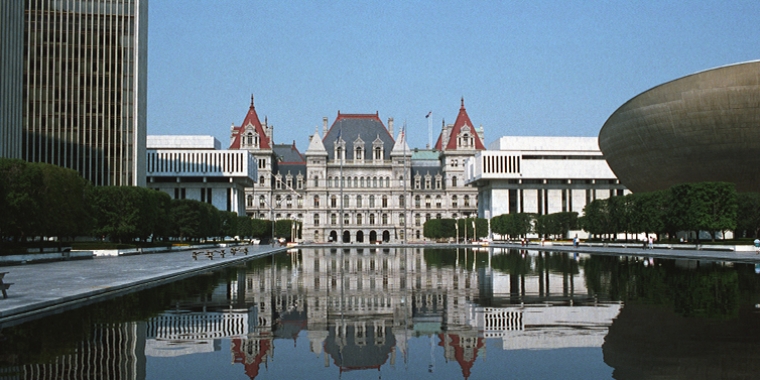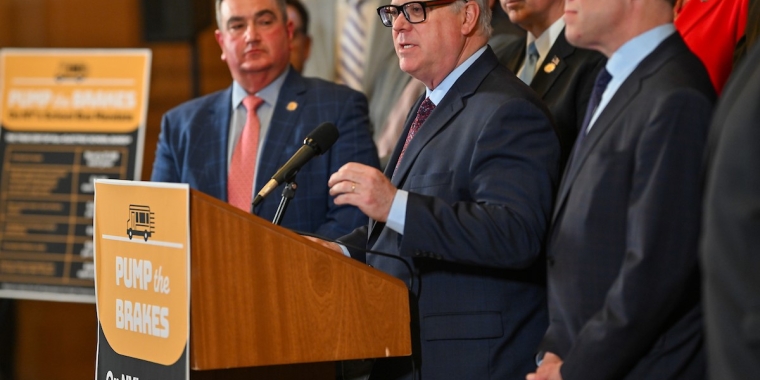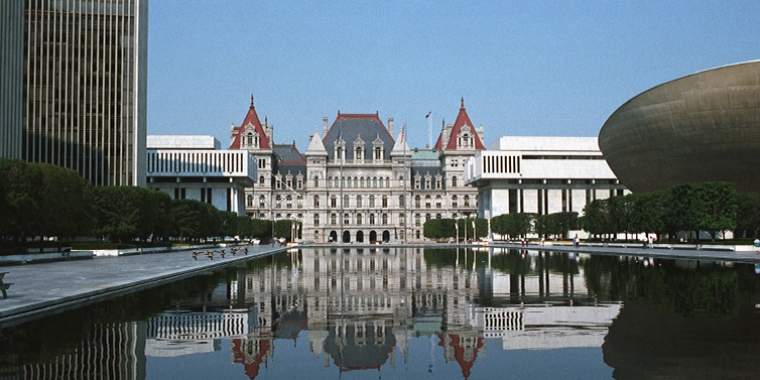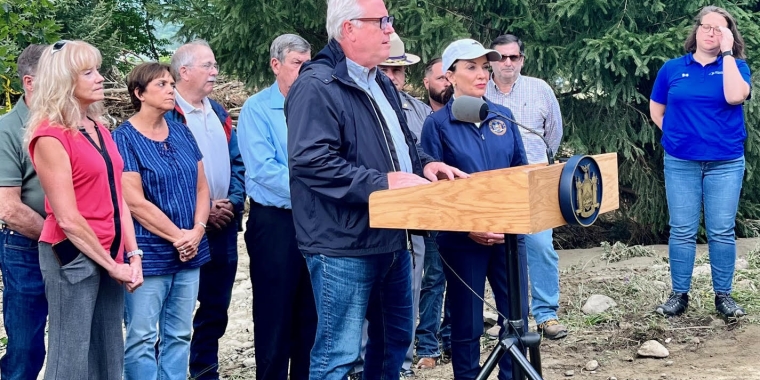
Senate budget stays focused on jobs, infrastructure, heroin: O'Mara highlights stronger state commitment to local transportation, water infrastructure
March 15, 2017
-
ISSUE:
- New York State budget
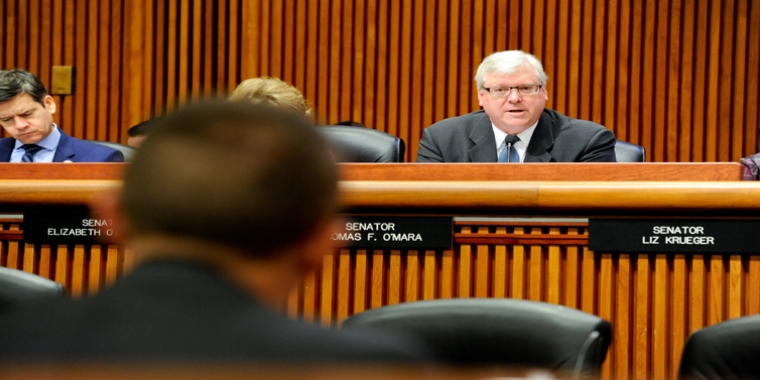
Albany, N.Y., March 15—State Senator Tom O’Mara (R-C, Big Flats) said that among the highlights of the Senate’s “one-house budget” being approved today is a call for a stronger state commitment to funding for local water quality and transportation infrastructure, and the rejection of hundreds of millions of dollars in new taxes and fees proposed by Governor Andrew Cuomo earlier this year.
“The Senate budget renews and revitalizes New York State’s commitment to local job growth, local tax relief, local environments, local infrastructure, and local community safety and development,” said O’Mara, a member of the Senate Finance Committee. “It also rejects Governor Cuomo’s proposals for higher state taxes and fees, and strengthens our ongoing commitment to addressing the heroin and opioid crisis.”
This week’s passage of the Senate and Assembly 2017-2018 one-house budgets will set the table for meetings of the Legislature’s joint, public budget conference committees next week and, then, negotiations with Governor Andrew Cuomo on a final 2017-18 state budget by the start of New York’s next fiscal year on April 1. These one-house budgets largely serve as public statements of the priorities each legislative chamber will be staking out during the upcoming budget talks.
O’Mara, a member of the Senate Task Force on Heroin and Opioid Addiction, said the Senate budget includes over $200 million to continue to enhance the state’s heroin and opioid addiction prevention, treatment, recovery, and education services. He said the budget reflects input he and his colleagues have received at numerous local public forums they’ve conducted since 2014.
O’Mara, Chair of the Senate Environmental Conservation Committee, said that the Senate budget includes a plan unveiled earlier this week to direct approximately $8 billion to water quality initiatives. The Senate proposals include a $5-billion Clean Water Bond Act to provide critical funds for many different types of water quality projects; increased support for the Water Quality Infrastructure Improvement Act first established in 2015 to directly assist localities with undertaking drinking water and wastewater infrastructure projects; and the establishment of a Drinking Water Quality Institute comprised of public health experts, scientists, water purveyors, and the commissioners of state departments of Health and Environmental Conservation.
Additionally, the Senate plan calls for continuing to fully fund the state’s Environmental Protection Fund (EPF) at $300 million. The EPF supports critical local environmental initiatives including clean air and water projects that help create local jobs. O’Mara said that studies have shown that for every dollar of EPF funds invested in land and water protection, the state and localities get back seven dollars in economic benefits.
The Senate budget also calls for a $75-million increase in base aid for the Consolidated Highway Improvement Program (CHIPS), the main source of state aid for local roads, and an additional $50 million for the BRIDGE-NY program including $20 million specifically for culverts. O’Mara and Assemblyman Phil Palmesano (R,C,I-Corning) have led the “Local Roads Matter” campaign within the Legislature over the past several years. This year they organized a bipartisan group of 137 senators and members of the Assembly, nearly 65% of the Legislature’s total membership, who recently joined county and town highway superintendents and other local leaders from throughout the state to call for increased support for local roads, bridges and culverts. They noted that local roads and bridges account for 87% of the roads, 52% of the bridges, and 48% of the vehicle mileage logged in New York State.
O’Mara, noting that the Senate budget stays within a self-imposed two-percent spending cap, said that other highlights of the Senate budget include:
> $45 million to compensate direct care professionals for the important work they do to support people with disabilities. O’Mara said that the Senate is seeking to address a lack of funding in Governor Andrew Cuomo’s proposed 2017-18 state budget to help appropriately adjust salaries at not-for-profits that employ workers who provide state services for individuals with autism, serious brain injury, cerebral palsy, Down syndrome, and other developmental disabilities;
> an overall increase of $1.2 billion in state Foundation Aid to public schools;
> an $8-million increase in state library aid, and a $15-million increase for state library construction aid;
> a tax credit of up to $5,000 to farmers who donate fresh produce to food banks and other emergency food providers, commonly known as the “Farm to Food Bank” initiative which O’Mara has consistently co-sponsored and that has been approved by Legislature but vetoed by the governor for the past two years. O’Mara and other supporters are hopeful that the tax credit will be enacted this year;
> restoring more than $12 million in agricultural program funding cuts proposed by Cuomo this year. Since 2011, O’Mara, a member of the Senate Agriculture Committee, said that the Senate GOP has initiated budget restorations and funding for new programs totaling more than $32 million. Among other programs and institutions the governor has proposed to cut or eliminate funding for this year are the Wine and Grape Foundation, Farm-to-Seniors Assistance, Tractor Rollover Prevention Program, FarmNet (Farm Family Assistance), Local Fair Assistance, and the Cornell Diagnostic Lab along with other vital Cornell research and study programs invaluable to the dairy industry among other critical agricultural challenges including food safety research and study, disease detection and prevention, honeybee die-off, invasive species, pesticide use, and rabies prevention and treatment; and
> the rejection of hundreds of millions of dollars in new tax-and-fee increases proposed by Cuomo. According to the Senate and Assembly fiscal committees, the governor’s 2017-2018 proposed state budget, which he unveiled in late January, contains upwards of $800 million in higher taxes and increased fees, including a series of new motor vehicle fees, new taxes on internet purchases, a new surcharge on pre-paid cell phones, as well as reinstatement of an expiring high-earner’s tax.
“The last thing a New York State taxpayer needs is to have to pay another tax or another fee,” said O’Mara. “We need to be moving in the other direction, which means lower taxes and fewer fees.”
Next week the Legislature will convene joint, public budget conference committees to settle legislative differences on this year’s budget and reach agreements with Cuomo on a final budget. The upcoming conference committees can be watched live HERE.
Read more on the Senate Budget HERE.
Share this Article or Press Release
Newsroom
Go to Newsroom